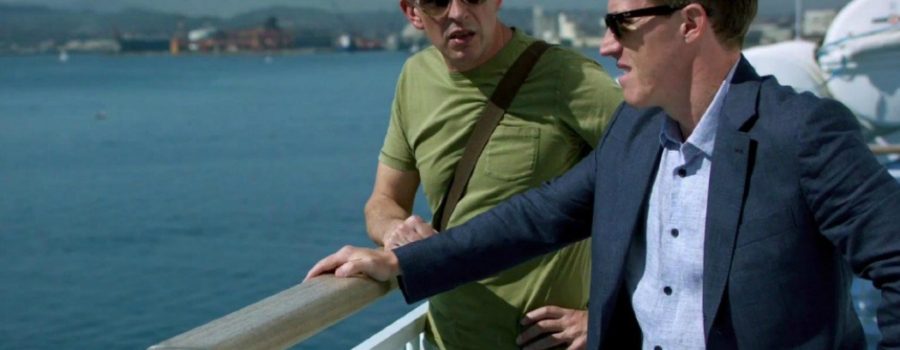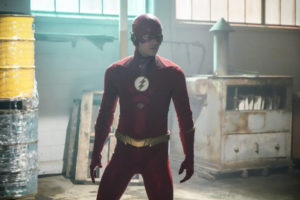[Published at Film Inquiry] Much like Richard Linklater’s Before Trilogy, there was never an overarching plan going into making The Trip; the trio of director, Michael Winterbottom and actors, Steve Coogan and Rob Brydon made an experimental film, and it exceeded all expectations, similar to what the trio of Linklater, Ethan Hawke, and Julie Delpy did with Before Sunrise. Winterbottom, Coogan, and Brydon, who, before The Trip, previously collaborated on the indie Tony Wilson (Coogan) biopic, 24 Hour Party People, have an obvious creative chemistry that has only strengthened with The Trip To Spain.
After The Trip, the three amigos hit the road again on another hilarious comedy of errors, The Trip To Italy. Now, with The Trip To Spain, the trio may have made their funniest entry in the now-deemed, “the Trip trilogy.” Though there are many reasons why this may be the last film in the franchise, let’s hope, for comedy’s sake, that Winterbottom, Coogan, and Brydon keep taking reckless albeit endearing road trips for the rest of their lives.
The Trip trilogy has a wonderful formula: two hilarious frienemies, a road trip across breathtaking settings, six days, and six meals. “If it ain’t broke, don’t fix it,” as the American saying goes. The Trip To Spain is akin to an old family recipe; with each new entry, the trio finds new narrative ways to explore an established concept, just as each new generation introduced to a precious family recipe adds a unique twist or additional ingredient, keeping the tradition alive and fresh.
In a historical sense, the third film of any planned trilogy, let-alone unplanned trilogy, typically falters. However, just as Before Midnight accomplished with the Before Trilogy, The Trip To Spain doesn’t skip a narrative beat in the context of the Trip Trilogy; it continues to build upon the more genuine emotion of its previous entries that has increasingly shined through as Coogan and Brydon have become more mature. As such, their exaggerated portrayals of themselves, their onscreen counterparts, have become more mature, more wise. The impressions come aplenty, the ad-libbed lines are expertly delivered, but Coogan and Brydon bare their true selves more than the prior two entries of Winterbottom’s trilogy, resulting in a poignant levity beneath the brilliant comedy that reveals a satisfyingly unbridled vulnerability in its two leads.
On The Road Again
Winterbottom, Coogan, and Brydon’s latest effort is the best film of the trilogy. Immediately, The Trip To Spain provides a more honest version of the actors. During the myriad of delicious meal conversations, Brydon and Coogan show more of an interest in each other’s lives than they ever have onscreen. In doing so, by finally climbing over their battling egos and revealing more than simply impressions and witty banter, they peel a layer off of their alternate personas. The audience gets a sense that they’re actually friends, not just professional acquaintances that circumstantially and reluctantly get together every few years to review superior restaurants around the world.

I viewed Coogan’s The Dinner earlier this year at the International Berlin Film Festival, citing his performance as the best of the decade (until Robert Pattinson’s showcase in Good Time). Make no mistake, Steve Coogan is one of the best actors of his generation. In the first film of the Trip Trilogy, Coogan struggles incessantly to break away from his funnyman typecast to try and land more meaty rolls that would allow him to flex his dramatic chops. It was self-deprecatingly poking fun at Coogan’s apparently sudden midlife aspirations to become a more serious actor and be accepted as such by peers, while also acknowledging Coogan’s artistic range.
However, this time around, Coogan has already achieved his goal at becoming an accoladed dramatic actor. In fact, he received a Best Writing, Adapted Screenplay and Best Motion Picture Of The Year nomination at the Academy Awards for his work on Philomena, and has proven time and again his depth as a dramatic actor in the years since The Trip. Appropriately contrary to the first film, The Trip To Spain celebrates Coogan’s newfound dramatic success while simultaneously making fun of the sense of entitlement it has given him; Brydon notes how Coogan can’t go five minutes without talking about Philomena.
Winterbottom and Coogan use this plot point as a vehicle to break down the facade and over-emphasis on hubris, self-importance, and ego in Hollywood. The materialistic Oscar nominations, which he recurrently brings up to his agent, can’t seem to be enough for Coogan, who is never satisfied with himself throughout the Trip trilogy. Ever the ambitious artist, since he’s accomplished his acting goals over the past six years since The Trip, he now wants to be taken more seriously as a writer by his peers; he’s fed up with how he thinks the entertainment industry views him. He always has been.
The Friendship Finally Flourishes
The duo span the country of Spain under the notion that they are purveyors of the arts, history, and culture, and indeed they are, obviously. However, they add but a touch of pretentiousness to their dual personas. The competition between the two strong personalities we’ve come to expect from the first two films is conspicuous in The Trip To Spain, but Coogan and Brydon indulge each other’s opposing comedic approaches far more this time around. They’ve grown to accept each other’s contrasting personalities and petty annoyances, and rather than getting into arguments over their differences, they’ve reduced their friendly rivalry to subtle eye rolls and simple brush-offs.
Whereas Coogan is the damaged, unfulfilled character, Brydon is quite happy with where he is in life and has no problem going on these trips to mollycoddle himself and, sure, stroke Coogan’s ego by playing the sidekick part to his leading man again, but more importantly to him, spend some quality time with his old pal. Brydon went through his midlife crisis in The Trip To Italyand had his affair, but that life wasn’t for him. He’s grown up since then, and his family has grown larger.

For Brydon, Spain is a break from the difficulties and stressful routines of raising a young family as it always has been, but for Coogan, this particular trip is a bit more cogitative. There is something complex within him, a deep-rooted, soulful despondency. He longs for youthfulness, carrying a borderline delusional idea that he will write an adventure novel of his and Brydon’s“epic quest” this time around à la novelist Laurie Lee’s As I Walked Out One Midsummer Morning.
These films have grown more sincere without losing their comedic impact. The score never once hints at a lighthearted sound, reminding the audience that this isn’t a slapstick comedy, but rather something that takes itself a little more seriously than the previous two entries in the franchise. Winterbottom, Coogan, and Brydon make a valid point – while humor is paramount to mental health, life isn’t entirely comedy and parody, and, often, comedy is synonymous with pain; misery loves comedy. Coogan is the most vulnerable he’s ever allowed himself to be in these reality-bending films. In fact, I believe this version of Coogan is closer to his true self than any other of the previous entries’ versions have been.
Winterbottom has created a feast for the eyes, not just for the stomach, with incredible landscapes capturing lesser known parts of Spain and the Spanish countryside coupled with mouth-watering dishes. Coogan and Brydon’s back-and-forth about who is the better historian fits in well with the gorgeous, sweeping images of Spain, providing a historical context for the imagery along their road trip.
What Else Is New?
New impressions include Mick Jagger, Roger Moore, Ian McKellen, Anthony Hopkins, Marlon Brando, accompanied by a wonderful rehashing of all the previous impressions that audiences have grown accustomed to. The two actors also pay an endearing tribute to their fellow fallen countrymen and actors, John Hurt and David Bowie. Throughout the film there are important references to famous writers Lee, George Orwell and Spanish writer, Miguel de Cervantes, who wrote Don Quixote. On this trip, Brydon is the Sancho Panza to Coogan’sDon Quixote. Coogan’s romanticized, overblown version of himself parallels Don Quixote’s misguided idealist archetype.

There is a consistent and timely parallel of the Spanish Inquisition to that of what’s happening around the world right now: the spreading of wrongful, negative judgment, and skewed notions of Islam. Coogan and Brydon attend various monuments and memorials where certain historical events occurred as they talk about the Spanish Inquisition, during which Cooganpersistently praises the Moors (who were Muslism). Brydon’s viewpoints about good and evil are very black and white, whereas Coogan takes a more philosophical approach to war and religion.
As many know, Muslims and Jews were violently persecuted during the Spanish Inquisition by the Catholics. That started with prejudice and a sense of superiority. In that sense, the beginning of the Spanish Inquisition is similar to the persecution and diaspora that Muslims all over the world are facing as a result of ignorant generalizations of Islamic ideologies based on small and radicalized groups like ISIS that twist and misinterpret the Quran’s words to justify and promote psychotic violence.
However, whereas it’s a fraction of Islam today that practices extremism, in a historical context, it has almost always been the majority of Catholics (and Christians) who commit genocide and promote intolerance, particularly in the case of the Spanish Inquisition, the mass killings and brutality of which were expressly ordered by Pope Sixtus IV in the Vatican. Whether it has been a religious minority or majority undergoing persecution or persecuting other religions, almost every faith has had its own dark, militant, and animalistic history.
Through this parallel, Winterbottom and Coogan bring into light a glaring hypocrisy with the faint hope that history won’t repeat itself in the nasty, cyclical way it has been doing for the past millennium. Of course, since this is a film in the Trip trilogy, there’s a hilarious twist of poetic justice during the last 60 seconds of the film that challenges Coogan’s aspirations to be bold, adventurous, and willing to fight for a cause with conviction like Orwell did in The Spanish Civil War in the 1930s.
The Beginning Of The End, The End Of The Beginning
Do not deprive yourself of the meditative and powerful third act. By the end, Brydon moves on with his family as he always has on these trips, having taken them at face value, a relaxing getaway with a chance for some bromance and good food, all while fulfilling his vocational obligation to write restaurant reviews.

For Coogan, these trips have always been much more meaningful, especially in The Trip To Spain; it is a seeming unfiltered look into soul-searching and finding a way to be happy with oneself, to be comfortable in one’s own skin. As a result, Coogan’s alter-ego gets his own, much-deserved epilogue of adventure – a mini-odyssey of self-discovery – seemingly realizing the young adult version of himself’s desire to live a life as eventful as those of Lee’s, Orwell’sand de Cervantes’s. It even sets up a possible sequel that could take the franchise is a completely different direction (though unlikely). During this epilogue, the audience gets a brief hint at whether or not Coogan can really walk the walk like he talks the talk.
Part of the Trip trilogy is about growing up; we have two children trapped in adult men’s bodies doing their best to deal with man-opause in their own odd, quirky ways. Winterbottom, Coogan, and Brydon have enough material, discourse, and context to make these films forever. However, aside from the twist-ending, a looming sense of finality lingers in this third entry. Beneath all of the humor, immersive cultural experiences, delicious food, and luscious landscapes in The Trip To Spain, there is a surprising emotional and bitingly honest chord that rings mellifluous with the audience.
Which installment of the Trip trilogy did you enjoy the most? What’s your favorite Brydon or Coogan impression? Are you interested in seeing more of their onscreen alter-egos in the future? Tell us in the comments below!
The Trip To Spain was released theatrically in the United States on August 11, 2017. It is now also playing on certain on demand platforms. For all international release dates, see here.








Leave a Reply
Your email is safe with us.